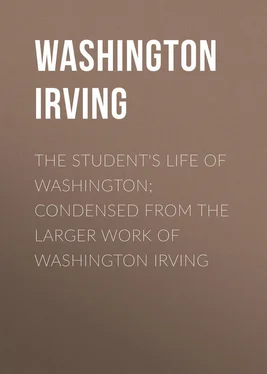Washington Irving - The Student's Life of Washington; Condensed from the Larger Work of Washington Irving
Здесь есть возможность читать онлайн «Washington Irving - The Student's Life of Washington; Condensed from the Larger Work of Washington Irving» — ознакомительный отрывок электронной книги совершенно бесплатно, а после прочтения отрывка купить полную версию. В некоторых случаях можно слушать аудио, скачать через торрент в формате fb2 и присутствует краткое содержание. Издательство: Иностранный паблик, Жанр: literature_19, foreign_antique, foreign_prose, на английском языке. Описание произведения, (предисловие) а так же отзывы посетителей доступны на портале библиотеки ЛибКат.
- Название:The Student's Life of Washington; Condensed from the Larger Work of Washington Irving
- Автор:
- Издательство:Иностранный паблик
- Жанр:
- Год:неизвестен
- ISBN:нет данных
- Рейтинг книги:3 / 5. Голосов: 1
-
Избранное:Добавить в избранное
- Отзывы:
-
Ваша оценка:
- 60
- 1
- 2
- 3
- 4
- 5
The Student's Life of Washington; Condensed from the Larger Work of Washington Irving: краткое содержание, описание и аннотация
Предлагаем к чтению аннотацию, описание, краткое содержание или предисловие (зависит от того, что написал сам автор книги «The Student's Life of Washington; Condensed from the Larger Work of Washington Irving»). Если вы не нашли необходимую информацию о книге — напишите в комментариях, мы постараемся отыскать её.
The Student's Life of Washington; Condensed from the Larger Work of Washington Irving — читать онлайн ознакомительный отрывок
Ниже представлен текст книги, разбитый по страницам. Система сохранения места последней прочитанной страницы, позволяет с удобством читать онлайн бесплатно книгу «The Student's Life of Washington; Condensed from the Larger Work of Washington Irving», без необходимости каждый раз заново искать на чём Вы остановились. Поставьте закладку, и сможете в любой момент перейти на страницу, на которой закончили чтение.
Интервал:
Закладка:
Notwithstanding the decided part taken by Washington in the popular movement, very friendly relations existed between him and Lord Dunmore. The latter appreciated his character, and sought to avail himself of his experience in the affairs of the province. It was even concerted that Washington should accompany his lordship on an extensive tour, which the latter intended to make in the course of the summer along the western frontier. A melancholy circumstance occurred to defeat this arrangement.
We have spoken of Washington's paternal conduct towards the two children of Mrs. Washington. The daughter, Miss Custis had long been an object of extreme solicitude. She was of a fragile constitution, and for some time past had been in very declining health. Early in the present summer, symptoms indicated a rapid change for the worse. Washington was absent from home at the time. On his return to Mount Vernon he found her in the last stage of consumption. Though not a man given to bursts of sensibility, he is said on the present occasion to have evinced the deepest affliction; kneeling by her bedside, and pouring out earnest prayers for her recovery. She expired on the 19th of June, in the seventeenth year of her age. This, of course put an end to Washington's intention of accompanying Lord Dunmore to the frontier: he remained at home to console Mrs. Washington in her affliction – furnishing his lordship, however, with travelling hints and directions, and recommending proper guides.
The general covenant throughout the colonies against the use of taxed tea had operated disastrously against the interests of the East India Company, and produced an immense accumulation of the proscribed article in their warehouses. To remedy this Lord North brought in a bill (1773), by which the company were allowed to export their teas from England to any part whatever, without paying export duty. This, by enabling them to offer their teas at a low price in the colonies would, he supposed, tempt the Americans to purchase large quantities, thus relieving the company, and at the same time benefiting the revenue by the impost duty. Confiding in the wisdom of this policy, the company disgorged their warehouses, freighted several ships with tea, and sent them to various parts of the colonies. This brought matters to a crisis. One sentiment, one determination, pervaded the whole continent. Taxation was to receive its definitive blow. Whoever submitted to it was an enemy to his country. From New York and Philadelphia the ships were sent back, unladen, to London. In Charleston the tea was unloaded, and stored away in cellars and other places, where it perished. At Boston the action was still more decisive. The ships anchored in the harbor. Some small parcels of tea were brought on shore, but the sale of them was prohibited.
To settle the matter completely, and prove that on a point of principle they were not to be trifled with, a number of inhabitants, disguised as Indians, boarded the ships in the night (18th December), broke open all the chests of tea, and emptied the contents into the sea. The general opposition of the colonies to the principle of taxation had given great annoyance to government, but this individual act concentrated all its wrath upon Boston. A bill was forthwith passed in Parliament (commonly called the Boston port bill), by which all lading and unlading of goods, wares, and merchandise, were to cease in that town and harbor on and after the 4th of June, and the officers of the customs to be transferred to Salem.
Another law, passed soon after, altered the charter of the province, decreeing that all counsellors, judges, and magistrates, should be appointed by the crown, and hold office during the royal pleasure. This was followed by a third, intended for the suppression of riots; and providing that any person indicted for murder, or other capital offence, committed in aiding the magistracy, might be sent by the governor to some other colony, or to Great Britain, for trial.
Such was the bolt of Parliamentary wrath fulminated against the devoted town of Boston. Before it fell there was a session in May of the Virginia House of Burgesses. The social position of Lord Dunmore had been strengthened in the province by the arrival of his lady, and a numerous family of sons and daughters. The House of Burgesses was opened in form, and one of its first measures was an address of congratulation to the governor on the arrival of his lady. It was followed up by an agreement among the members to give her ladyship a splendid ball, on the 27th of the month.
All things were going on smoothly and smilingly, when a letter, received through the corresponding committee, brought intelligence of the vindictive measure of Parliament, by which the port of Boston was to be closed on the approaching 1st of June. The letter was read in the House of Burgesses, and produced a general burst of indignation. All other business was thrown aside, and this became the sole subject of discussion. A protest against this and other recent acts of Parliament was entered upon the journal of the House, and a resolution was adopted, on the 24th of May, setting apart the 1st of June as a day of fasting, prayer, and humiliation. On the following morning the Burgesses were summoned to attend Lord Dunmore in the council chamber, where he made them the following laconic speech: "Mr. Speaker, and Gentlemen of the House of Burgesses: I have in my hand a paper, published by order of your House, conceived in such terms as reflect highly upon his majesty, and the Parliament of Great Britain, which makes it necessary for me to dissolve you, and you are dissolved accordingly."
As on a former occasion, the Assembly, though dissolved was not dispersed. The members adjourned to the long room of the old Raleigh tavern, and passed resolutions denouncing the Boston port bill as a most dangerous attempt to destroy the constitutional liberty and rights of all North America; recommending their countrymen to desist from the use, not merely of tea, but of all kinds of East Indian commodities; pronouncing an attack on one of the colonies, to enforce arbitrary taxes, an attack on all; and ordering the committee of correspondence to communicate with the other corresponding committees on the expediency of appointing deputies from the several colonies of British America to meet annually in GENERAL CONGRESS, at such place as might be deemed expedient, to deliberate on such measures as the united interests of the colonies might require.
This was the first recommendation of a General Congress by any public assembly, though it had been previously proposed in town meetings at New York and Boston. A resolution to the same effect was passed in the Assembly of Massachusetts before it was aware of the proceedings of the Virginia Legislature. The measure recommended met with prompt and general concurrence throughout the colonies, and the fifth day of September next ensuing was fixed upon for the meeting of the first Congress, which was to be held at Philadelphia.
On the 29th, letters arrived from Boston giving the proceedings of a town meeting, recommending that a general league should be formed throughout the colonies suspending all trade with Great Britain. But twenty-five members of the late House of Burgesses, including Washington, were at that time remaining in Williamsburg. They held a meeting on the following day, at which Peyton Randolph presided as moderator. After some discussion it was determined to issue a printed circular, bearing their signatures, and calling a meeting of all the members of the late House of Burgesses, on the 1st of August, to take into consideration this measure of a general league. The circular recommended them, also, to collect, in the meantime, the sense of their respective counties.
In the meantime the Boston port bill had been carried into effect. On the 1st of June the harbor of Boston was closed at noon, and all business ceased. The two other parliamentary acts altering the charter of Massachusetts were to be enforced. No public meetings, excepting the annual town meetings in March and May, were to be held without permission of the governor.
Читать дальшеИнтервал:
Закладка:
Похожие книги на «The Student's Life of Washington; Condensed from the Larger Work of Washington Irving»
Представляем Вашему вниманию похожие книги на «The Student's Life of Washington; Condensed from the Larger Work of Washington Irving» списком для выбора. Мы отобрали схожую по названию и смыслу литературу в надежде предоставить читателям больше вариантов отыскать новые, интересные, ещё непрочитанные произведения.
Обсуждение, отзывы о книге «The Student's Life of Washington; Condensed from the Larger Work of Washington Irving» и просто собственные мнения читателей. Оставьте ваши комментарии, напишите, что Вы думаете о произведении, его смысле или главных героях. Укажите что конкретно понравилось, а что нет, и почему Вы так считаете.












